Evaluating AI Impact on Business Strategies and Worker Management
VerifiedAdded on 2023/06/10
|10
|2656
|98
Report
AI Summary
This report delves into the contemporary issues surrounding artificial intelligence (AI) and its profound impact on business strategies and human resource (HR) management. It begins by examining competitive strategy models, such as cost leadership, differentiation, and focus, and how AI can be leveraged to gain a competitive advantage. The report then explores various HR theories and how AI supports talent acquisition, employee learning and development, and change management within a global competitive climate. Case studies of companies like Marks & Spencer and Morrisons are used to illustrate these concepts. The report concludes by emphasizing the importance of talent acquisition, training, and effective change management strategies for organizations seeking to thrive in the modern business environment. The report is available on Desklib, a platform providing AI-based study tools.
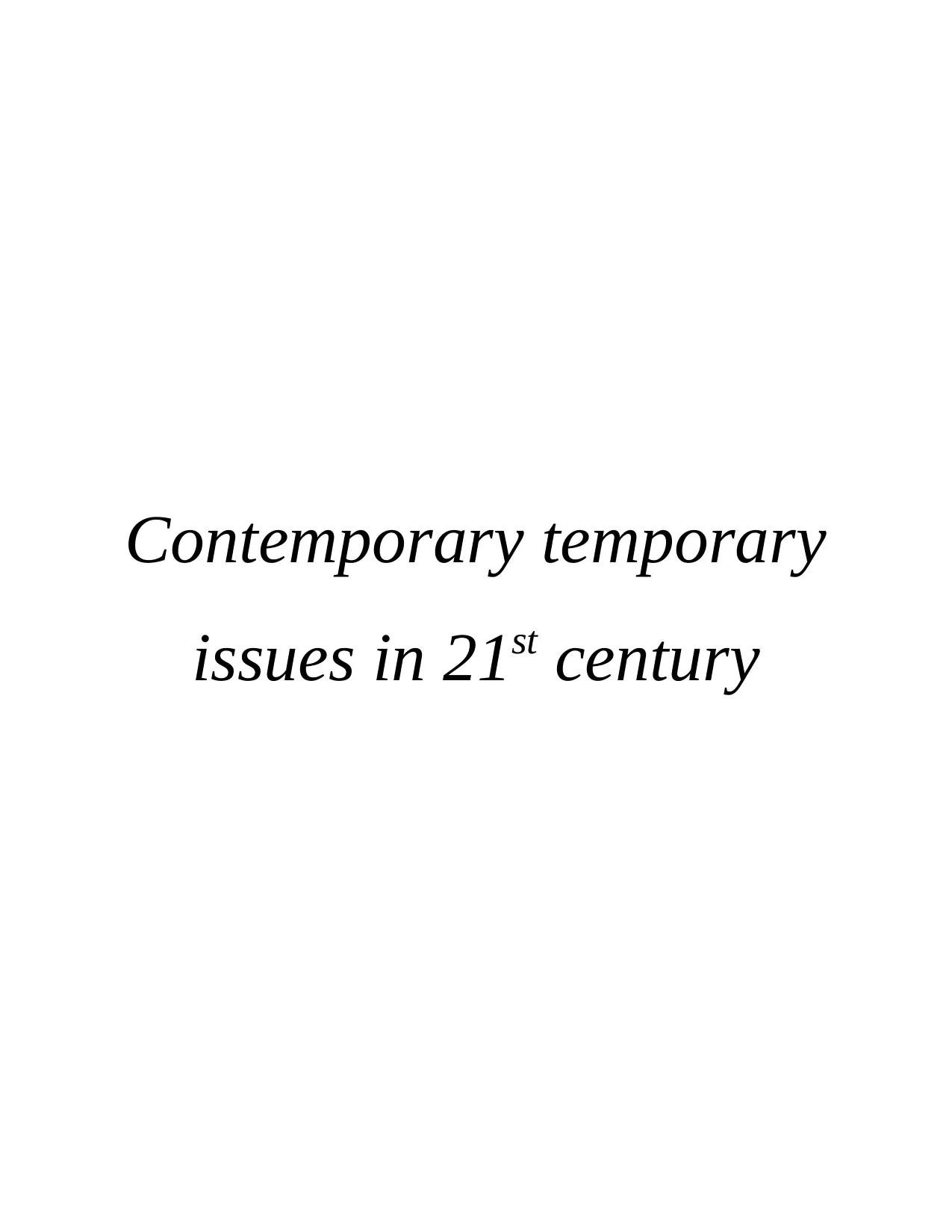
Contemporary temporary
issues in 21st century
issues in 21st century
Paraphrase This Document
Need a fresh take? Get an instant paraphrase of this document with our AI Paraphraser
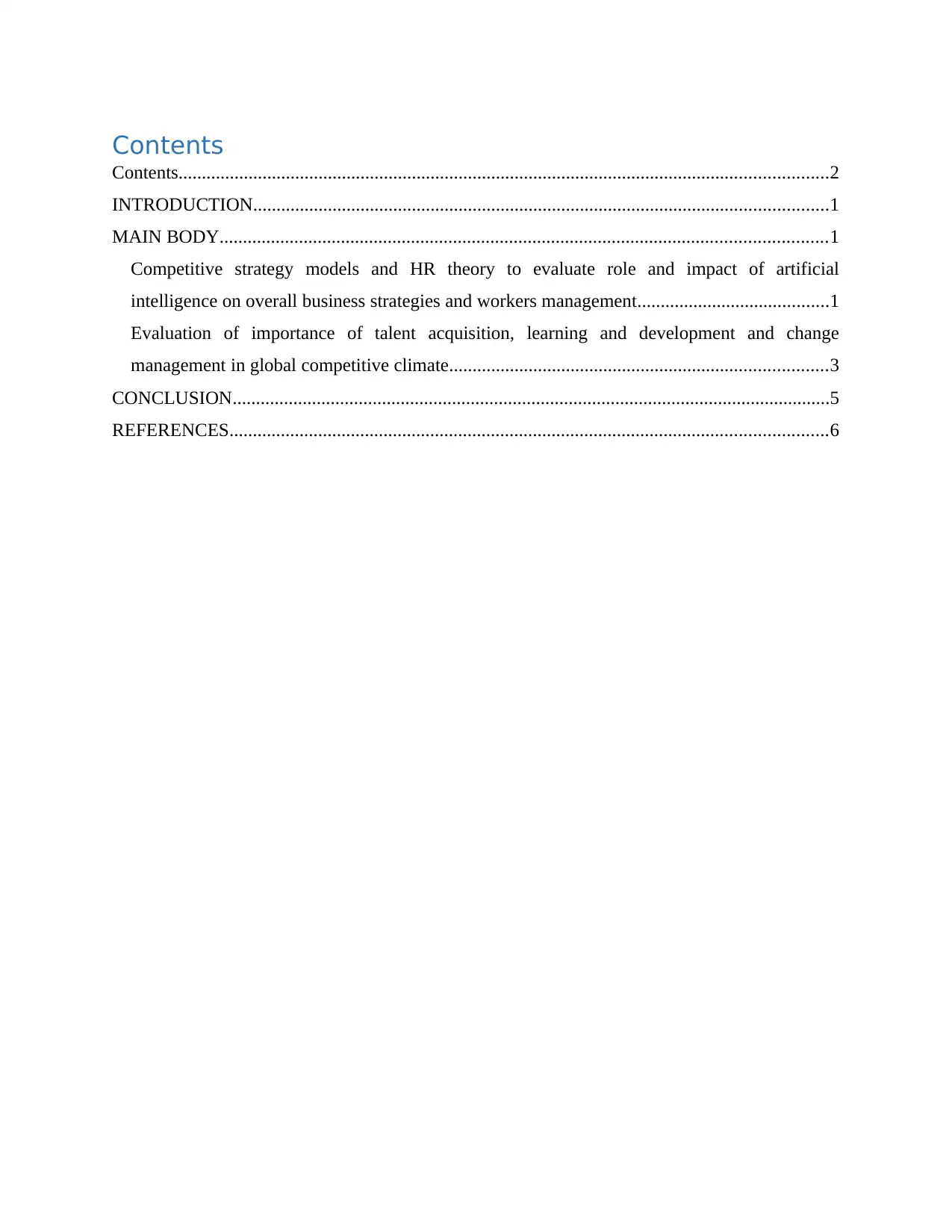
Contents
Contents...........................................................................................................................................2
INTRODUCTION...........................................................................................................................1
MAIN BODY..................................................................................................................................1
Competitive strategy models and HR theory to evaluate role and impact of artificial
intelligence on overall business strategies and workers management.........................................1
Evaluation of importance of talent acquisition, learning and development and change
management in global competitive climate.................................................................................3
CONCLUSION................................................................................................................................5
REFERENCES................................................................................................................................6
Contents...........................................................................................................................................2
INTRODUCTION...........................................................................................................................1
MAIN BODY..................................................................................................................................1
Competitive strategy models and HR theory to evaluate role and impact of artificial
intelligence on overall business strategies and workers management.........................................1
Evaluation of importance of talent acquisition, learning and development and change
management in global competitive climate.................................................................................3
CONCLUSION................................................................................................................................5
REFERENCES................................................................................................................................6

⊘ This is a preview!⊘
Do you want full access?
Subscribe today to unlock all pages.

Trusted by 1+ million students worldwide
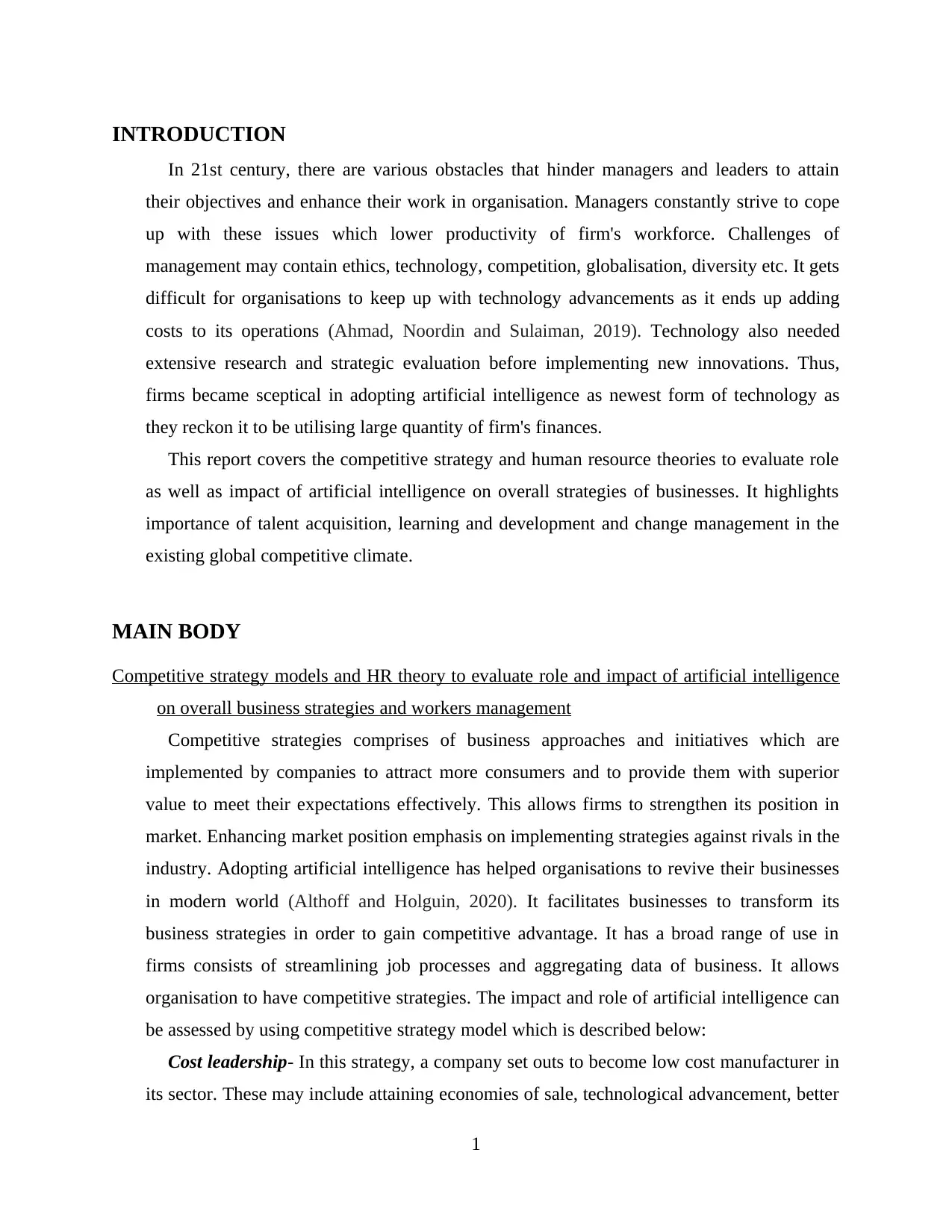
INTRODUCTION
In 21st century, there are various obstacles that hinder managers and leaders to attain
their objectives and enhance their work in organisation. Managers constantly strive to cope
up with these issues which lower productivity of firm's workforce. Challenges of
management may contain ethics, technology, competition, globalisation, diversity etc. It gets
difficult for organisations to keep up with technology advancements as it ends up adding
costs to its operations (Ahmad, Noordin and Sulaiman, 2019). Technology also needed
extensive research and strategic evaluation before implementing new innovations. Thus,
firms became sceptical in adopting artificial intelligence as newest form of technology as
they reckon it to be utilising large quantity of firm's finances.
This report covers the competitive strategy and human resource theories to evaluate role
as well as impact of artificial intelligence on overall strategies of businesses. It highlights
importance of talent acquisition, learning and development and change management in the
existing global competitive climate.
MAIN BODY
Competitive strategy models and HR theory to evaluate role and impact of artificial intelligence
on overall business strategies and workers management
Competitive strategies comprises of business approaches and initiatives which are
implemented by companies to attract more consumers and to provide them with superior
value to meet their expectations effectively. This allows firms to strengthen its position in
market. Enhancing market position emphasis on implementing strategies against rivals in the
industry. Adopting artificial intelligence has helped organisations to revive their businesses
in modern world (Althoff and Holguin, 2020). It facilitates businesses to transform its
business strategies in order to gain competitive advantage. It has a broad range of use in
firms consists of streamlining job processes and aggregating data of business. It allows
organisation to have competitive strategies. The impact and role of artificial intelligence can
be assessed by using competitive strategy model which is described below:
Cost leadership- In this strategy, a company set outs to become low cost manufacturer in
its sector. These may include attaining economies of sale, technological advancement, better
1
In 21st century, there are various obstacles that hinder managers and leaders to attain
their objectives and enhance their work in organisation. Managers constantly strive to cope
up with these issues which lower productivity of firm's workforce. Challenges of
management may contain ethics, technology, competition, globalisation, diversity etc. It gets
difficult for organisations to keep up with technology advancements as it ends up adding
costs to its operations (Ahmad, Noordin and Sulaiman, 2019). Technology also needed
extensive research and strategic evaluation before implementing new innovations. Thus,
firms became sceptical in adopting artificial intelligence as newest form of technology as
they reckon it to be utilising large quantity of firm's finances.
This report covers the competitive strategy and human resource theories to evaluate role
as well as impact of artificial intelligence on overall strategies of businesses. It highlights
importance of talent acquisition, learning and development and change management in the
existing global competitive climate.
MAIN BODY
Competitive strategy models and HR theory to evaluate role and impact of artificial intelligence
on overall business strategies and workers management
Competitive strategies comprises of business approaches and initiatives which are
implemented by companies to attract more consumers and to provide them with superior
value to meet their expectations effectively. This allows firms to strengthen its position in
market. Enhancing market position emphasis on implementing strategies against rivals in the
industry. Adopting artificial intelligence has helped organisations to revive their businesses
in modern world (Althoff and Holguin, 2020). It facilitates businesses to transform its
business strategies in order to gain competitive advantage. It has a broad range of use in
firms consists of streamlining job processes and aggregating data of business. It allows
organisation to have competitive strategies. The impact and role of artificial intelligence can
be assessed by using competitive strategy model which is described below:
Cost leadership- In this strategy, a company set outs to become low cost manufacturer in
its sector. These may include attaining economies of sale, technological advancement, better
1
Paraphrase This Document
Need a fresh take? Get an instant paraphrase of this document with our AI Paraphraser
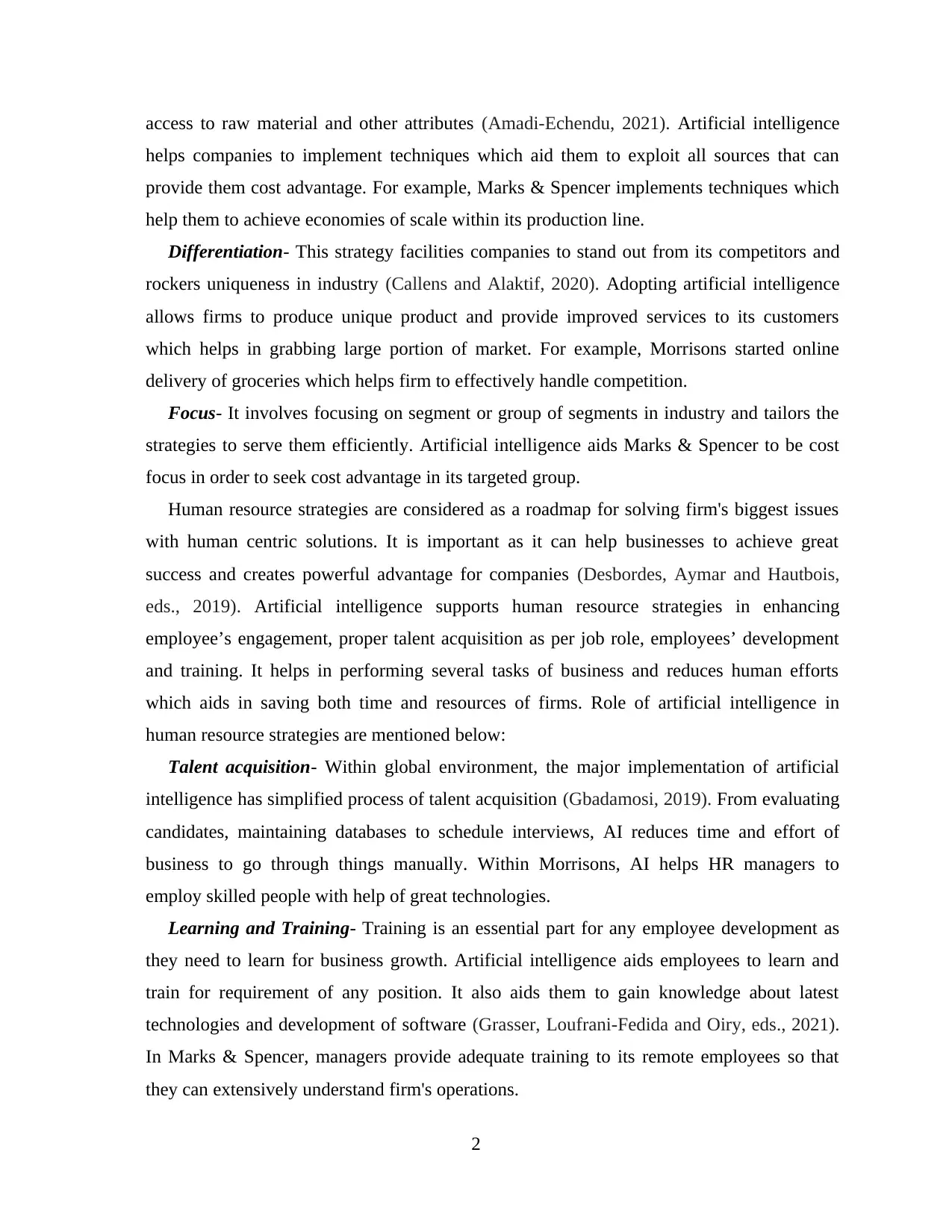
access to raw material and other attributes (Amadi-Echendu, 2021). Artificial intelligence
helps companies to implement techniques which aid them to exploit all sources that can
provide them cost advantage. For example, Marks & Spencer implements techniques which
help them to achieve economies of scale within its production line.
Differentiation- This strategy facilities companies to stand out from its competitors and
rockers uniqueness in industry (Callens and Alaktif, 2020). Adopting artificial intelligence
allows firms to produce unique product and provide improved services to its customers
which helps in grabbing large portion of market. For example, Morrisons started online
delivery of groceries which helps firm to effectively handle competition.
Focus- It involves focusing on segment or group of segments in industry and tailors the
strategies to serve them efficiently. Artificial intelligence aids Marks & Spencer to be cost
focus in order to seek cost advantage in its targeted group.
Human resource strategies are considered as a roadmap for solving firm's biggest issues
with human centric solutions. It is important as it can help businesses to achieve great
success and creates powerful advantage for companies (Desbordes, Aymar and Hautbois,
eds., 2019). Artificial intelligence supports human resource strategies in enhancing
employee’s engagement, proper talent acquisition as per job role, employees’ development
and training. It helps in performing several tasks of business and reduces human efforts
which aids in saving both time and resources of firms. Role of artificial intelligence in
human resource strategies are mentioned below:
Talent acquisition- Within global environment, the major implementation of artificial
intelligence has simplified process of talent acquisition (Gbadamosi, 2019). From evaluating
candidates, maintaining databases to schedule interviews, AI reduces time and effort of
business to go through things manually. Within Morrisons, AI helps HR managers to
employ skilled people with help of great technologies.
Learning and Training- Training is an essential part for any employee development as
they need to learn for business growth. Artificial intelligence aids employees to learn and
train for requirement of any position. It also aids them to gain knowledge about latest
technologies and development of software (Grasser, Loufrani-Fedida and Oiry, eds., 2021).
In Marks & Spencer, managers provide adequate training to its remote employees so that
they can extensively understand firm's operations.
2
helps companies to implement techniques which aid them to exploit all sources that can
provide them cost advantage. For example, Marks & Spencer implements techniques which
help them to achieve economies of scale within its production line.
Differentiation- This strategy facilities companies to stand out from its competitors and
rockers uniqueness in industry (Callens and Alaktif, 2020). Adopting artificial intelligence
allows firms to produce unique product and provide improved services to its customers
which helps in grabbing large portion of market. For example, Morrisons started online
delivery of groceries which helps firm to effectively handle competition.
Focus- It involves focusing on segment or group of segments in industry and tailors the
strategies to serve them efficiently. Artificial intelligence aids Marks & Spencer to be cost
focus in order to seek cost advantage in its targeted group.
Human resource strategies are considered as a roadmap for solving firm's biggest issues
with human centric solutions. It is important as it can help businesses to achieve great
success and creates powerful advantage for companies (Desbordes, Aymar and Hautbois,
eds., 2019). Artificial intelligence supports human resource strategies in enhancing
employee’s engagement, proper talent acquisition as per job role, employees’ development
and training. It helps in performing several tasks of business and reduces human efforts
which aids in saving both time and resources of firms. Role of artificial intelligence in
human resource strategies are mentioned below:
Talent acquisition- Within global environment, the major implementation of artificial
intelligence has simplified process of talent acquisition (Gbadamosi, 2019). From evaluating
candidates, maintaining databases to schedule interviews, AI reduces time and effort of
business to go through things manually. Within Morrisons, AI helps HR managers to
employ skilled people with help of great technologies.
Learning and Training- Training is an essential part for any employee development as
they need to learn for business growth. Artificial intelligence aids employees to learn and
train for requirement of any position. It also aids them to gain knowledge about latest
technologies and development of software (Grasser, Loufrani-Fedida and Oiry, eds., 2021).
In Marks & Spencer, managers provide adequate training to its remote employees so that
they can extensively understand firm's operations.
2
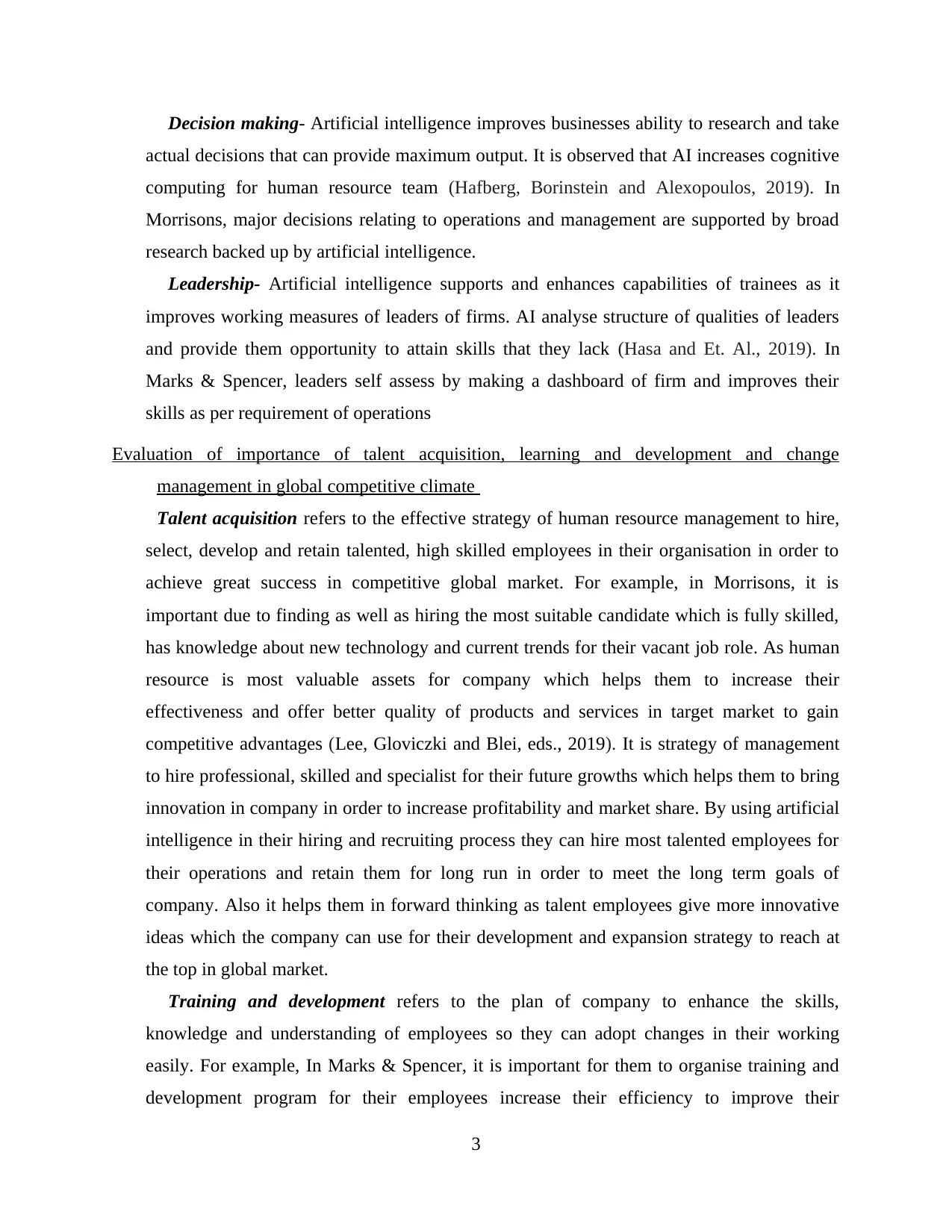
Decision making- Artificial intelligence improves businesses ability to research and take
actual decisions that can provide maximum output. It is observed that AI increases cognitive
computing for human resource team (Hafberg, Borinstein and Alexopoulos, 2019). In
Morrisons, major decisions relating to operations and management are supported by broad
research backed up by artificial intelligence.
Leadership- Artificial intelligence supports and enhances capabilities of trainees as it
improves working measures of leaders of firms. AI analyse structure of qualities of leaders
and provide them opportunity to attain skills that they lack (Hasa and Et. Al., 2019). In
Marks & Spencer, leaders self assess by making a dashboard of firm and improves their
skills as per requirement of operations
Evaluation of importance of talent acquisition, learning and development and change
management in global competitive climate
Talent acquisition refers to the effective strategy of human resource management to hire,
select, develop and retain talented, high skilled employees in their organisation in order to
achieve great success in competitive global market. For example, in Morrisons, it is
important due to finding as well as hiring the most suitable candidate which is fully skilled,
has knowledge about new technology and current trends for their vacant job role. As human
resource is most valuable assets for company which helps them to increase their
effectiveness and offer better quality of products and services in target market to gain
competitive advantages (Lee, Gloviczki and Blei, eds., 2019). It is strategy of management
to hire professional, skilled and specialist for their future growths which helps them to bring
innovation in company in order to increase profitability and market share. By using artificial
intelligence in their hiring and recruiting process they can hire most talented employees for
their operations and retain them for long run in order to meet the long term goals of
company. Also it helps them in forward thinking as talent employees give more innovative
ideas which the company can use for their development and expansion strategy to reach at
the top in global market.
Training and development refers to the plan of company to enhance the skills,
knowledge and understanding of employees so they can adopt changes in their working
easily. For example, In Marks & Spencer, it is important for them to organise training and
development program for their employees increase their efficiency to improve their
3
actual decisions that can provide maximum output. It is observed that AI increases cognitive
computing for human resource team (Hafberg, Borinstein and Alexopoulos, 2019). In
Morrisons, major decisions relating to operations and management are supported by broad
research backed up by artificial intelligence.
Leadership- Artificial intelligence supports and enhances capabilities of trainees as it
improves working measures of leaders of firms. AI analyse structure of qualities of leaders
and provide them opportunity to attain skills that they lack (Hasa and Et. Al., 2019). In
Marks & Spencer, leaders self assess by making a dashboard of firm and improves their
skills as per requirement of operations
Evaluation of importance of talent acquisition, learning and development and change
management in global competitive climate
Talent acquisition refers to the effective strategy of human resource management to hire,
select, develop and retain talented, high skilled employees in their organisation in order to
achieve great success in competitive global market. For example, in Morrisons, it is
important due to finding as well as hiring the most suitable candidate which is fully skilled,
has knowledge about new technology and current trends for their vacant job role. As human
resource is most valuable assets for company which helps them to increase their
effectiveness and offer better quality of products and services in target market to gain
competitive advantages (Lee, Gloviczki and Blei, eds., 2019). It is strategy of management
to hire professional, skilled and specialist for their future growths which helps them to bring
innovation in company in order to increase profitability and market share. By using artificial
intelligence in their hiring and recruiting process they can hire most talented employees for
their operations and retain them for long run in order to meet the long term goals of
company. Also it helps them in forward thinking as talent employees give more innovative
ideas which the company can use for their development and expansion strategy to reach at
the top in global market.
Training and development refers to the plan of company to enhance the skills,
knowledge and understanding of employees so they can adopt changes in their working
easily. For example, In Marks & Spencer, it is important for them to organise training and
development program for their employees increase their efficiency to improve their
3
⊘ This is a preview!⊘
Do you want full access?
Subscribe today to unlock all pages.

Trusted by 1+ million students worldwide
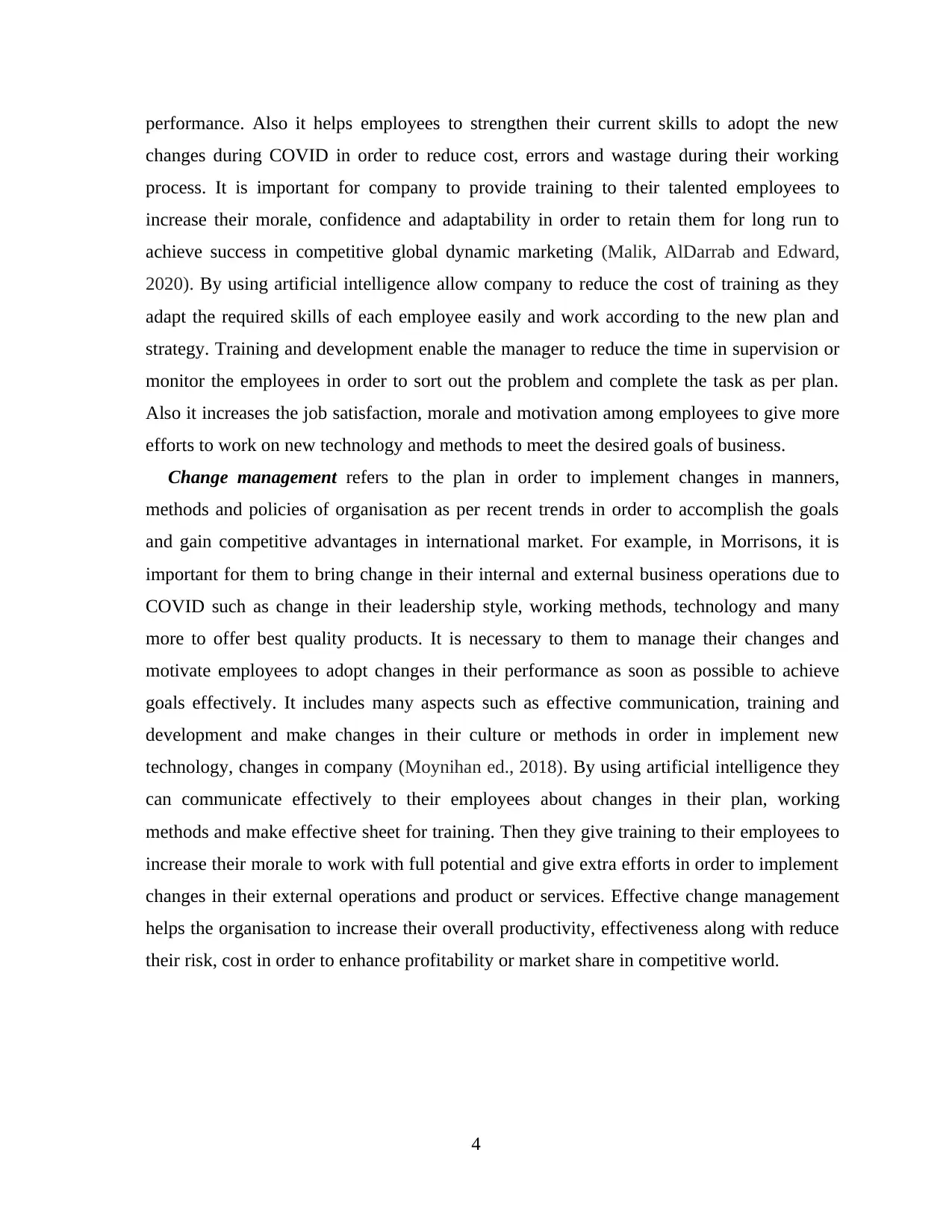
performance. Also it helps employees to strengthen their current skills to adopt the new
changes during COVID in order to reduce cost, errors and wastage during their working
process. It is important for company to provide training to their talented employees to
increase their morale, confidence and adaptability in order to retain them for long run to
achieve success in competitive global dynamic marketing (Malik, AlDarrab and Edward,
2020). By using artificial intelligence allow company to reduce the cost of training as they
adapt the required skills of each employee easily and work according to the new plan and
strategy. Training and development enable the manager to reduce the time in supervision or
monitor the employees in order to sort out the problem and complete the task as per plan.
Also it increases the job satisfaction, morale and motivation among employees to give more
efforts to work on new technology and methods to meet the desired goals of business.
Change management refers to the plan in order to implement changes in manners,
methods and policies of organisation as per recent trends in order to accomplish the goals
and gain competitive advantages in international market. For example, in Morrisons, it is
important for them to bring change in their internal and external business operations due to
COVID such as change in their leadership style, working methods, technology and many
more to offer best quality products. It is necessary to them to manage their changes and
motivate employees to adopt changes in their performance as soon as possible to achieve
goals effectively. It includes many aspects such as effective communication, training and
development and make changes in their culture or methods in order in implement new
technology, changes in company (Moynihan ed., 2018). By using artificial intelligence they
can communicate effectively to their employees about changes in their plan, working
methods and make effective sheet for training. Then they give training to their employees to
increase their morale to work with full potential and give extra efforts in order to implement
changes in their external operations and product or services. Effective change management
helps the organisation to increase their overall productivity, effectiveness along with reduce
their risk, cost in order to enhance profitability or market share in competitive world.
4
changes during COVID in order to reduce cost, errors and wastage during their working
process. It is important for company to provide training to their talented employees to
increase their morale, confidence and adaptability in order to retain them for long run to
achieve success in competitive global dynamic marketing (Malik, AlDarrab and Edward,
2020). By using artificial intelligence allow company to reduce the cost of training as they
adapt the required skills of each employee easily and work according to the new plan and
strategy. Training and development enable the manager to reduce the time in supervision or
monitor the employees in order to sort out the problem and complete the task as per plan.
Also it increases the job satisfaction, morale and motivation among employees to give more
efforts to work on new technology and methods to meet the desired goals of business.
Change management refers to the plan in order to implement changes in manners,
methods and policies of organisation as per recent trends in order to accomplish the goals
and gain competitive advantages in international market. For example, in Morrisons, it is
important for them to bring change in their internal and external business operations due to
COVID such as change in their leadership style, working methods, technology and many
more to offer best quality products. It is necessary to them to manage their changes and
motivate employees to adopt changes in their performance as soon as possible to achieve
goals effectively. It includes many aspects such as effective communication, training and
development and make changes in their culture or methods in order in implement new
technology, changes in company (Moynihan ed., 2018). By using artificial intelligence they
can communicate effectively to their employees about changes in their plan, working
methods and make effective sheet for training. Then they give training to their employees to
increase their morale to work with full potential and give extra efforts in order to implement
changes in their external operations and product or services. Effective change management
helps the organisation to increase their overall productivity, effectiveness along with reduce
their risk, cost in order to enhance profitability or market share in competitive world.
4
Paraphrase This Document
Need a fresh take? Get an instant paraphrase of this document with our AI Paraphraser
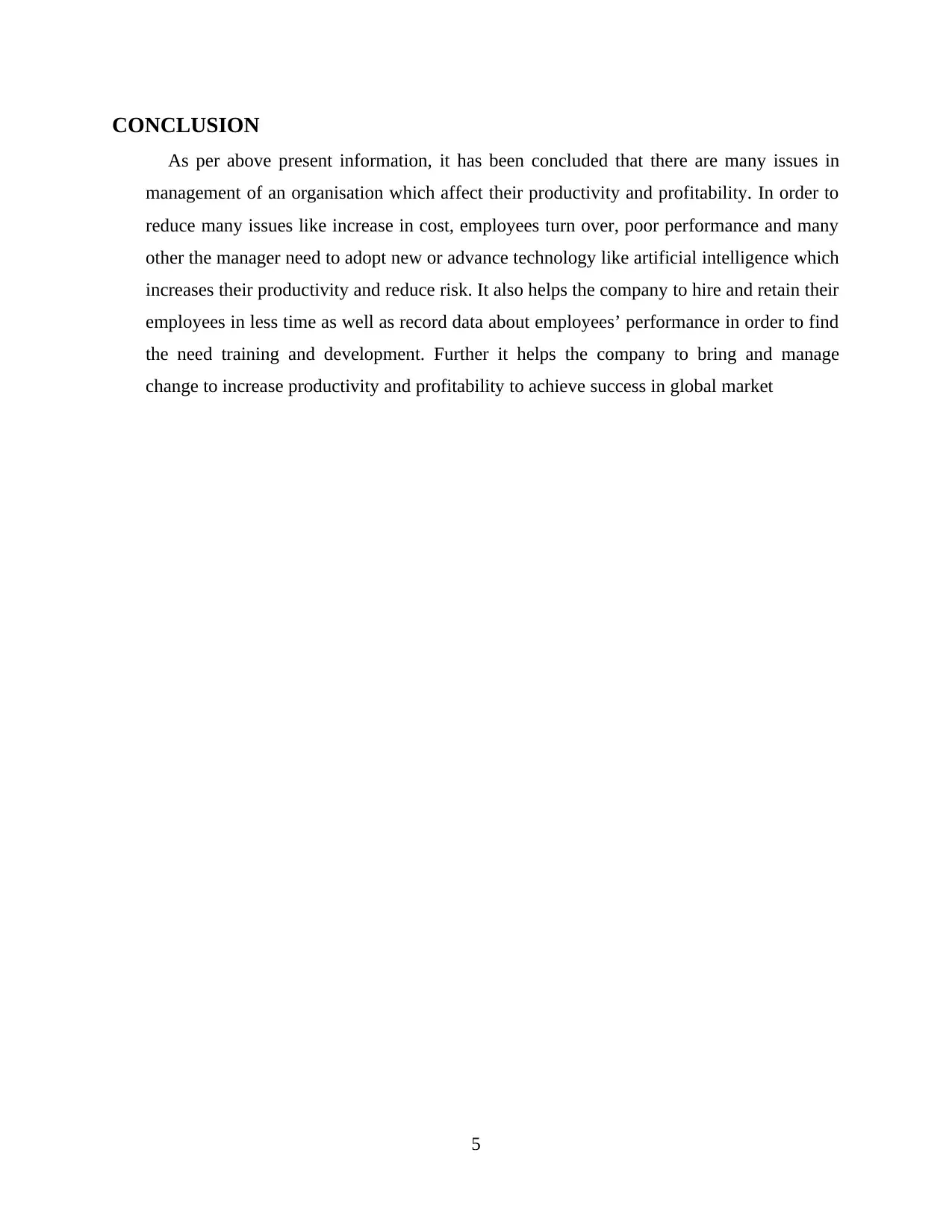
CONCLUSION
As per above present information, it has been concluded that there are many issues in
management of an organisation which affect their productivity and profitability. In order to
reduce many issues like increase in cost, employees turn over, poor performance and many
other the manager need to adopt new or advance technology like artificial intelligence which
increases their productivity and reduce risk. It also helps the company to hire and retain their
employees in less time as well as record data about employees’ performance in order to find
the need training and development. Further it helps the company to bring and manage
change to increase productivity and profitability to achieve success in global market
5
As per above present information, it has been concluded that there are many issues in
management of an organisation which affect their productivity and profitability. In order to
reduce many issues like increase in cost, employees turn over, poor performance and many
other the manager need to adopt new or advance technology like artificial intelligence which
increases their productivity and reduce risk. It also helps the company to hire and retain their
employees in less time as well as record data about employees’ performance in order to find
the need training and development. Further it helps the company to bring and manage
change to increase productivity and profitability to achieve success in global market
5
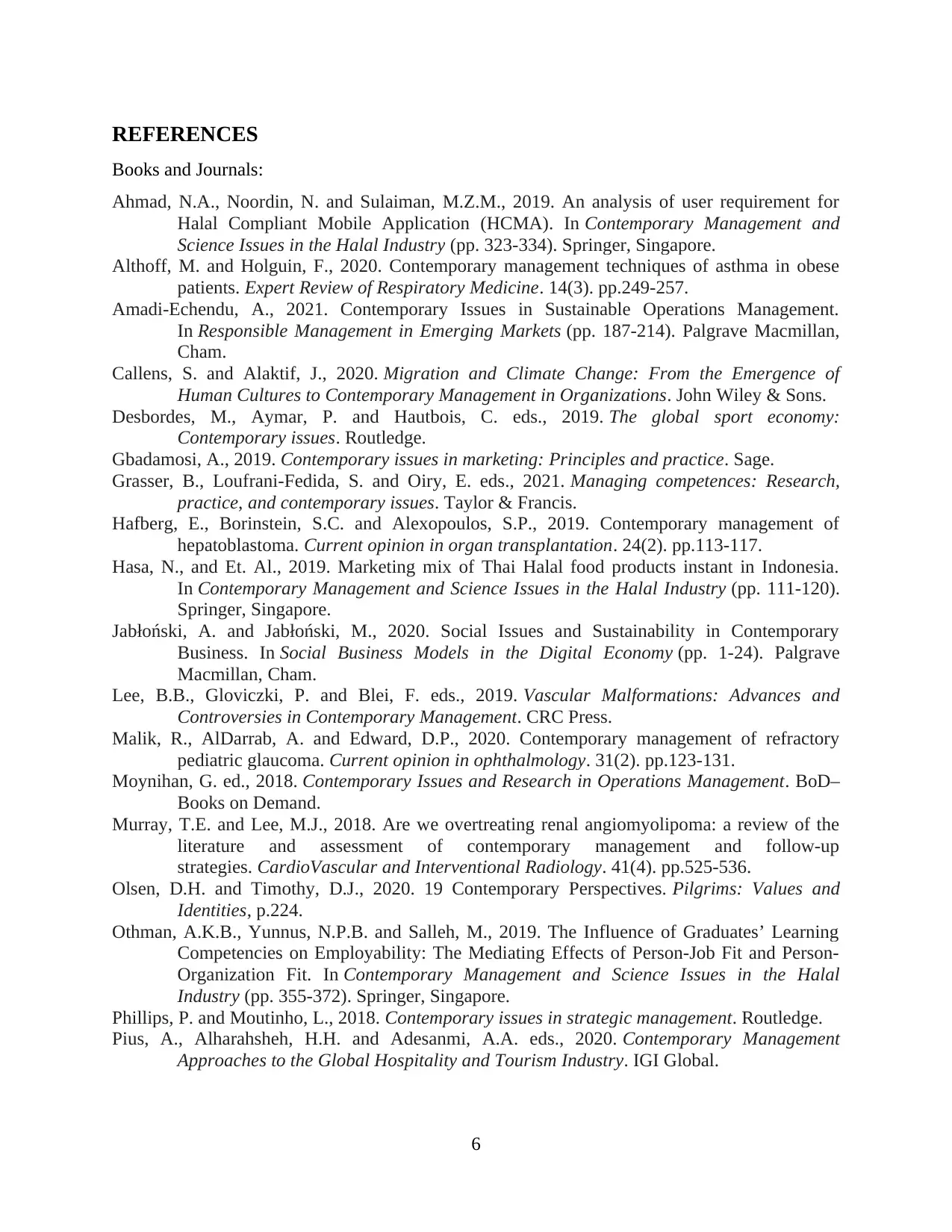
REFERENCES
Books and Journals:
Ahmad, N.A., Noordin, N. and Sulaiman, M.Z.M., 2019. An analysis of user requirement for
Halal Compliant Mobile Application (HCMA). In Contemporary Management and
Science Issues in the Halal Industry (pp. 323-334). Springer, Singapore.
Althoff, M. and Holguin, F., 2020. Contemporary management techniques of asthma in obese
patients. Expert Review of Respiratory Medicine. 14(3). pp.249-257.
Amadi-Echendu, A., 2021. Contemporary Issues in Sustainable Operations Management.
In Responsible Management in Emerging Markets (pp. 187-214). Palgrave Macmillan,
Cham.
Callens, S. and Alaktif, J., 2020. Migration and Climate Change: From the Emergence of
Human Cultures to Contemporary Management in Organizations. John Wiley & Sons.
Desbordes, M., Aymar, P. and Hautbois, C. eds., 2019. The global sport economy:
Contemporary issues. Routledge.
Gbadamosi, A., 2019. Contemporary issues in marketing: Principles and practice. Sage.
Grasser, B., Loufrani-Fedida, S. and Oiry, E. eds., 2021. Managing competences: Research,
practice, and contemporary issues. Taylor & Francis.
Hafberg, E., Borinstein, S.C. and Alexopoulos, S.P., 2019. Contemporary management of
hepatoblastoma. Current opinion in organ transplantation. 24(2). pp.113-117.
Hasa, N., and Et. Al., 2019. Marketing mix of Thai Halal food products instant in Indonesia.
In Contemporary Management and Science Issues in the Halal Industry (pp. 111-120).
Springer, Singapore.
Jabłoński, A. and Jabłoński, M., 2020. Social Issues and Sustainability in Contemporary
Business. In Social Business Models in the Digital Economy (pp. 1-24). Palgrave
Macmillan, Cham.
Lee, B.B., Gloviczki, P. and Blei, F. eds., 2019. Vascular Malformations: Advances and
Controversies in Contemporary Management. CRC Press.
Malik, R., AlDarrab, A. and Edward, D.P., 2020. Contemporary management of refractory
pediatric glaucoma. Current opinion in ophthalmology. 31(2). pp.123-131.
Moynihan, G. ed., 2018. Contemporary Issues and Research in Operations Management. BoD–
Books on Demand.
Murray, T.E. and Lee, M.J., 2018. Are we overtreating renal angiomyolipoma: a review of the
literature and assessment of contemporary management and follow-up
strategies. CardioVascular and Interventional Radiology. 41(4). pp.525-536.
Olsen, D.H. and Timothy, D.J., 2020. 19 Contemporary Perspectives. Pilgrims: Values and
Identities, p.224.
Othman, A.K.B., Yunnus, N.P.B. and Salleh, M., 2019. The Influence of Graduates’ Learning
Competencies on Employability: The Mediating Effects of Person-Job Fit and Person-
Organization Fit. In Contemporary Management and Science Issues in the Halal
Industry (pp. 355-372). Springer, Singapore.
Phillips, P. and Moutinho, L., 2018. Contemporary issues in strategic management. Routledge.
Pius, A., Alharahsheh, H.H. and Adesanmi, A.A. eds., 2020. Contemporary Management
Approaches to the Global Hospitality and Tourism Industry. IGI Global.
6
Books and Journals:
Ahmad, N.A., Noordin, N. and Sulaiman, M.Z.M., 2019. An analysis of user requirement for
Halal Compliant Mobile Application (HCMA). In Contemporary Management and
Science Issues in the Halal Industry (pp. 323-334). Springer, Singapore.
Althoff, M. and Holguin, F., 2020. Contemporary management techniques of asthma in obese
patients. Expert Review of Respiratory Medicine. 14(3). pp.249-257.
Amadi-Echendu, A., 2021. Contemporary Issues in Sustainable Operations Management.
In Responsible Management in Emerging Markets (pp. 187-214). Palgrave Macmillan,
Cham.
Callens, S. and Alaktif, J., 2020. Migration and Climate Change: From the Emergence of
Human Cultures to Contemporary Management in Organizations. John Wiley & Sons.
Desbordes, M., Aymar, P. and Hautbois, C. eds., 2019. The global sport economy:
Contemporary issues. Routledge.
Gbadamosi, A., 2019. Contemporary issues in marketing: Principles and practice. Sage.
Grasser, B., Loufrani-Fedida, S. and Oiry, E. eds., 2021. Managing competences: Research,
practice, and contemporary issues. Taylor & Francis.
Hafberg, E., Borinstein, S.C. and Alexopoulos, S.P., 2019. Contemporary management of
hepatoblastoma. Current opinion in organ transplantation. 24(2). pp.113-117.
Hasa, N., and Et. Al., 2019. Marketing mix of Thai Halal food products instant in Indonesia.
In Contemporary Management and Science Issues in the Halal Industry (pp. 111-120).
Springer, Singapore.
Jabłoński, A. and Jabłoński, M., 2020. Social Issues and Sustainability in Contemporary
Business. In Social Business Models in the Digital Economy (pp. 1-24). Palgrave
Macmillan, Cham.
Lee, B.B., Gloviczki, P. and Blei, F. eds., 2019. Vascular Malformations: Advances and
Controversies in Contemporary Management. CRC Press.
Malik, R., AlDarrab, A. and Edward, D.P., 2020. Contemporary management of refractory
pediatric glaucoma. Current opinion in ophthalmology. 31(2). pp.123-131.
Moynihan, G. ed., 2018. Contemporary Issues and Research in Operations Management. BoD–
Books on Demand.
Murray, T.E. and Lee, M.J., 2018. Are we overtreating renal angiomyolipoma: a review of the
literature and assessment of contemporary management and follow-up
strategies. CardioVascular and Interventional Radiology. 41(4). pp.525-536.
Olsen, D.H. and Timothy, D.J., 2020. 19 Contemporary Perspectives. Pilgrims: Values and
Identities, p.224.
Othman, A.K.B., Yunnus, N.P.B. and Salleh, M., 2019. The Influence of Graduates’ Learning
Competencies on Employability: The Mediating Effects of Person-Job Fit and Person-
Organization Fit. In Contemporary Management and Science Issues in the Halal
Industry (pp. 355-372). Springer, Singapore.
Phillips, P. and Moutinho, L., 2018. Contemporary issues in strategic management. Routledge.
Pius, A., Alharahsheh, H.H. and Adesanmi, A.A. eds., 2020. Contemporary Management
Approaches to the Global Hospitality and Tourism Industry. IGI Global.
6
⊘ This is a preview!⊘
Do you want full access?
Subscribe today to unlock all pages.

Trusted by 1+ million students worldwide
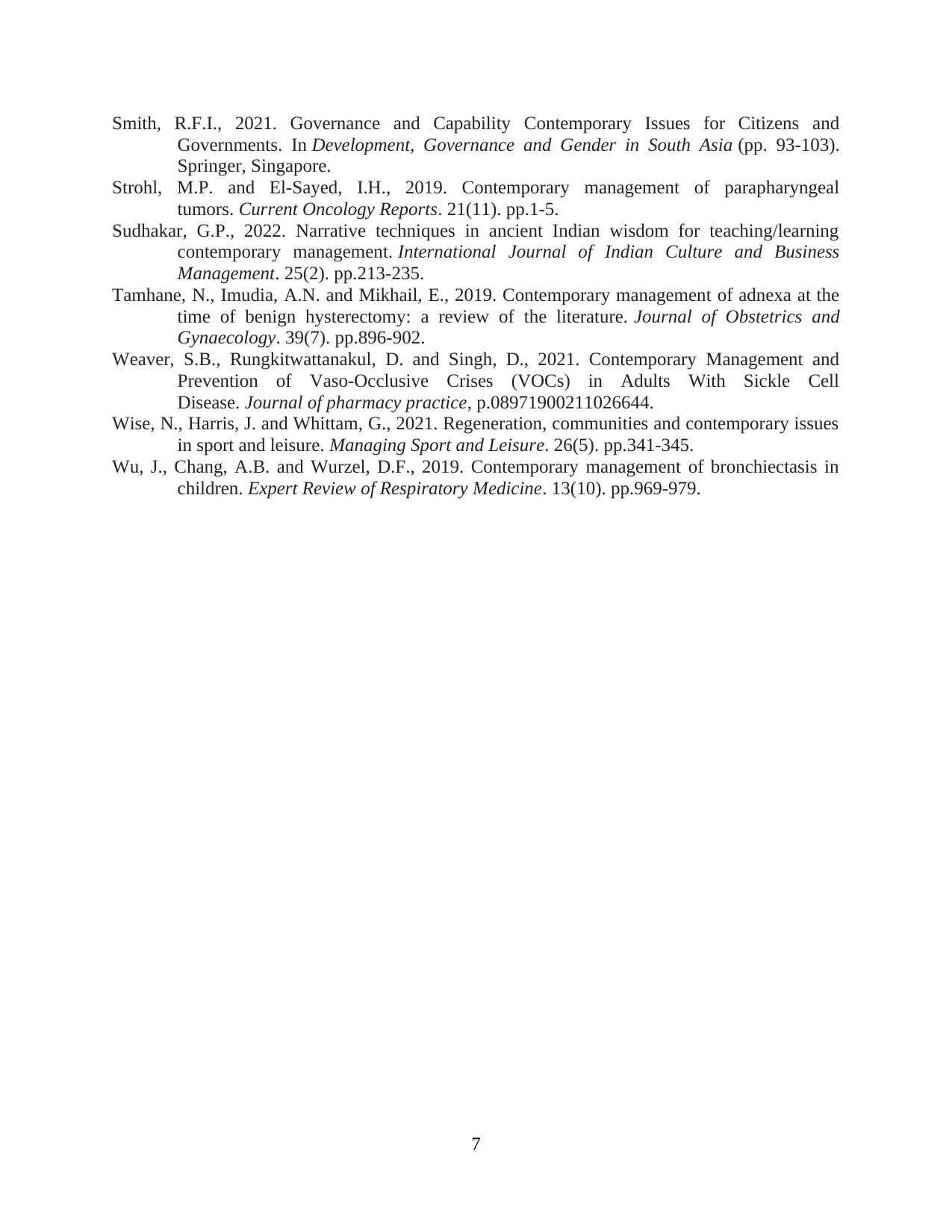
Smith, R.F.I., 2021. Governance and Capability Contemporary Issues for Citizens and
Governments. In Development, Governance and Gender in South Asia (pp. 93-103).
Springer, Singapore.
Strohl, M.P. and El-Sayed, I.H., 2019. Contemporary management of parapharyngeal
tumors. Current Oncology Reports. 21(11). pp.1-5.
Sudhakar, G.P., 2022. Narrative techniques in ancient Indian wisdom for teaching/learning
contemporary management. International Journal of Indian Culture and Business
Management. 25(2). pp.213-235.
Tamhane, N., Imudia, A.N. and Mikhail, E., 2019. Contemporary management of adnexa at the
time of benign hysterectomy: a review of the literature. Journal of Obstetrics and
Gynaecology. 39(7). pp.896-902.
Weaver, S.B., Rungkitwattanakul, D. and Singh, D., 2021. Contemporary Management and
Prevention of Vaso-Occlusive Crises (VOCs) in Adults With Sickle Cell
Disease. Journal of pharmacy practice, p.08971900211026644.
Wise, N., Harris, J. and Whittam, G., 2021. Regeneration, communities and contemporary issues
in sport and leisure. Managing Sport and Leisure. 26(5). pp.341-345.
Wu, J., Chang, A.B. and Wurzel, D.F., 2019. Contemporary management of bronchiectasis in
children. Expert Review of Respiratory Medicine. 13(10). pp.969-979.
7
Governments. In Development, Governance and Gender in South Asia (pp. 93-103).
Springer, Singapore.
Strohl, M.P. and El-Sayed, I.H., 2019. Contemporary management of parapharyngeal
tumors. Current Oncology Reports. 21(11). pp.1-5.
Sudhakar, G.P., 2022. Narrative techniques in ancient Indian wisdom for teaching/learning
contemporary management. International Journal of Indian Culture and Business
Management. 25(2). pp.213-235.
Tamhane, N., Imudia, A.N. and Mikhail, E., 2019. Contemporary management of adnexa at the
time of benign hysterectomy: a review of the literature. Journal of Obstetrics and
Gynaecology. 39(7). pp.896-902.
Weaver, S.B., Rungkitwattanakul, D. and Singh, D., 2021. Contemporary Management and
Prevention of Vaso-Occlusive Crises (VOCs) in Adults With Sickle Cell
Disease. Journal of pharmacy practice, p.08971900211026644.
Wise, N., Harris, J. and Whittam, G., 2021. Regeneration, communities and contemporary issues
in sport and leisure. Managing Sport and Leisure. 26(5). pp.341-345.
Wu, J., Chang, A.B. and Wurzel, D.F., 2019. Contemporary management of bronchiectasis in
children. Expert Review of Respiratory Medicine. 13(10). pp.969-979.
7
1 out of 10
Related Documents
Your All-in-One AI-Powered Toolkit for Academic Success.
+13062052269
info@desklib.com
Available 24*7 on WhatsApp / Email
![[object Object]](/_next/static/media/star-bottom.7253800d.svg)
Unlock your academic potential
Copyright © 2020–2026 A2Z Services. All Rights Reserved. Developed and managed by ZUCOL.

